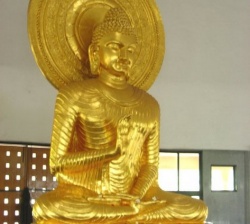Difference between revisions of "Samyaksambuddha"
| Line 1: | Line 1: | ||
[[File:Dd2655-grande.jpg|thumb|250px|]] | [[File:Dd2655-grande.jpg|thumb|250px|]] | ||
| − | |||
| − | The [[disciple]] of a [[samyaksambuddha]] is called a [[savaka]] ("[[hearer]]" or "follower") or, once [[enlightened]], an [[arahant]]. These terms have slightly varied meanings but can all be used to describe the [[enlightened]] [[disciple]]. [[Anubuddha]] is a rarely used term, but is used by the [[Buddha]] in the [[Khuddakapatha]] to refer to those who become [[Buddhas]] after [[being]] given instruction. [[Enlightened]] [[disciples]] attain [[nirvana]] and [[parinirvana]] as the two types of [[Buddha]] do. [[Arahant]] is the term most generally used for them, though it is also applicable to [[Buddhas]]. | + | |
| + | |||
| + | |||
| + | [[Samyaksambuddhas]] attain [[buddhahood]], then decide to teach others the [[truth]] they have discovered. | ||
| + | |||
| + | They lead others to [[awakening]] by [[teaching]] the [[Dharma]] in a [[time]] or [[world]] where it has been forgotten. | ||
| + | |||
| + | [[Siddhartha]] [[Gautama]] is considered a [[samyaksambuddha]]. | ||
| + | |||
| + | (See also the List of the [[28 Buddhas]] (all of whom are [[samyaksambuddhas]]).) | ||
| + | |||
| + | In [[order]] for one to become a [[Samyaksabuddha]] one must practice the 10 [[parami]] which are [[perfections]] that are attributed to all [[Samyaksambuddhas]]. | ||
| + | |||
| + | If one has the 10 [[parami]] and attains [[Buddhahood]] then he can be considered "[[perfectly enlightened]]" and fit to {{Wiki|preach}} the [[Dharma]]. | ||
| + | |||
| + | |||
| + | The [[disciple]] of a [[samyaksambuddha]] is called a [[savaka]] ("[[hearer]]" or "follower") or, once [[enlightened]], an [[arahant]]. | ||
| + | |||
| + | These terms have slightly varied meanings but can all be used to describe the [[enlightened]] [[disciple]]. | ||
| + | |||
| + | [[Anubuddha]] is a rarely used term, but is used by the [[Buddha]] in the [[Khuddakapatha]] to refer to those who become [[Buddhas]] after [[being]] given instruction. | ||
| + | |||
| + | [[Enlightened]] [[disciples]] attain [[nirvana]] and [[parinirvana]] as the two types of [[Buddha]] do. | ||
| + | |||
| + | [[Arahant]] is the term most generally used for them, though it is also applicable to [[Buddhas]]. | ||
{{R}} | {{R}} | ||
[http://users.telenet.be/bddh/about.html users.telenet.be] | [http://users.telenet.be/bddh/about.html users.telenet.be] | ||
[[Category:Buddhas]] | [[Category:Buddhas]] | ||
Latest revision as of 05:34, 1 December 2015
Samyaksambuddhas attain buddhahood, then decide to teach others the truth they have discovered.
They lead others to awakening by teaching the Dharma in a time or world where it has been forgotten.
Siddhartha Gautama is considered a samyaksambuddha.
(See also the List of the 28 Buddhas (all of whom are samyaksambuddhas).)
In order for one to become a Samyaksabuddha one must practice the 10 parami which are perfections that are attributed to all Samyaksambuddhas.
If one has the 10 parami and attains Buddhahood then he can be considered "perfectly enlightened" and fit to preach the Dharma.
The disciple of a samyaksambuddha is called a savaka ("hearer" or "follower") or, once enlightened, an arahant.
These terms have slightly varied meanings but can all be used to describe the enlightened disciple.
Anubuddha is a rarely used term, but is used by the Buddha in the Khuddakapatha to refer to those who become Buddhas after being given instruction.
Enlightened disciples attain nirvana and parinirvana as the two types of Buddha do.
Arahant is the term most generally used for them, though it is also applicable to Buddhas.
